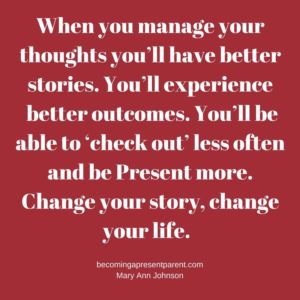
Do you ever feel like you do everything, and everyone else in your family sits by and watches! I know that feeling well. Last week I shared an example of how powerful our thoughts and the stories they create are in the happiness we experience in life. Today I want to share another example.
Back in 2015, before my mother came to live with us, there were two people living in our home, me and my husband, Don. Our children were out building their own lives, so the workload was less, but I was still taking care of most of the “family” stuff. I did most of the dishes, cooked most of the meals, did most of the cleaning and laundry.
I decided that I needed more help. I discovered that Don would fold the laundry if I put it in a basket on the couch. We had a conversation about meals, and Don determined that he would cook on Tuesdays and Wednesdays, my busiest days. He began vacuuming more often.
In the laundry room, there is a clothes hanger. When outer clothes are washed, they are taken straight out of the dryer and hung up. Saves on ironing! The challenge was getting the hung clothes from the laundry room to the bedroom closet.
After our talk, I noticed that Don was taking the hung clothes to the bedroom closet. That is, he was taking his clothes. I observed this phenomenon for quite a few weeks.
Each time I noticed that he had hung his clothes in the closet and that mine were still in the laundry room, I would feel a slight twinge of irritation. After all, when I hung the clothes in the closet, I would take them all, his and mine. After a few months, I began to feel something besides irritation. It was easy to allow thoughts such as these to enter my mind: “What, doesn’t he think that I matter?” “If he cared, he would put all the clothes away.” “Is he just trying to make me mad?” I recognized this place – story land – and I have learned that there is very little happiness there.
Take Control, Don’t Allow Negative thoughts and Stories
So, I did what I have learned to do, I wouldn’t allow those thoughts to fester in my mind, and so I asked Don about it. “Don, when I put the hanging clothes away, I put them all away, yours and mine. But, I noticed that when you put the hanging clothes away, you only put yours away. Is there a reason for that?”
You would laugh if you could have seen the look of confusion on his face. It was priceless, and he said, “Well, don’t you have your clothes in some kind of order?” Boy, I got it right then, and I began laughing. My closet would have been a maze to my husband. All my clothes are hung in order of color and type of garment. My new story – he was doing me a BIG favor by not hanging my clothes in the closet!
We have more control over our thoughts than we realize. We can choose which thoughts we are going to hold in our minds and which ones we will get rid of. It takes some work, but you can learn to control your thoughts and the stories that they create.
Good Relationships Flourish When Stories are Positive
When you hold thoughts about what you want rather than what you don’t want, you can improve your family relationships in some significant ways. Want to read a fantastic example of how one mother completely changed her relationship with a “problem” child by simply changing her mental story about him? It will enlighten you, and I hope it gets you thinking about your stories and how they affect your family dynamics.
When you lose control of your thoughts, you lose control of your life.
6 Steps to Take Control of Your Thoughts
- Identify – Begin by identifying your daily negative thoughts. Write them down. Have a notebook to keep track of them or try journaling.
- Say NO – Don’t allow the thought to stay in your mind and turn into a story.
- Rewrite – Immediately change the negative thought into a positive one. For example, if you wake up thinking, “I am so tired!” immediately say out loud something like, “I am going to have a terrific day.” You don’t have to believe it; just say it.
- Vocabulary Counts – Use positive language. Not “I am not going to yell,” but “I am calm.”
- Facts, not Assumptions – If you have negative thoughts about an experience or a person, don’t make assumptions; get more facts. Ask!
- The benefit of the doubt – It helps to believe that people are doing the best they can. They usually are even when it doesn’t look like it.
As we learn to control our thoughts, we give our children a considerable gift. They will know that they are responsible for how their lives look and feel. It will give them a leg up in the world and their relationships.
Change your thoughts and change your world. Norman Vincent Peale
Do you want a tool to help you begin taking control of your daily thoughts? If you do, reach out, and I will send you a worksheet to get you going on the road to better family relationships.







